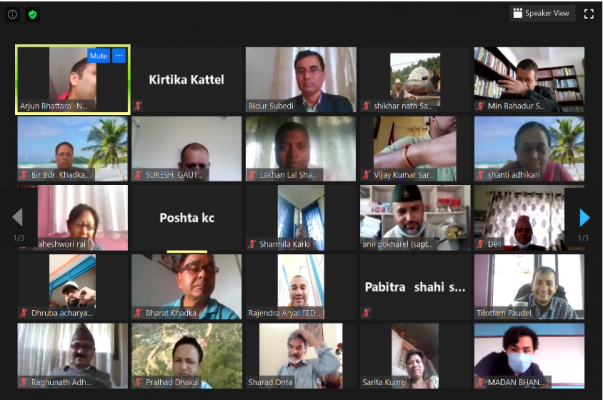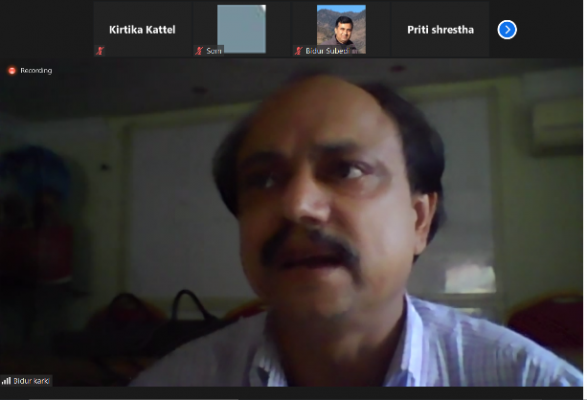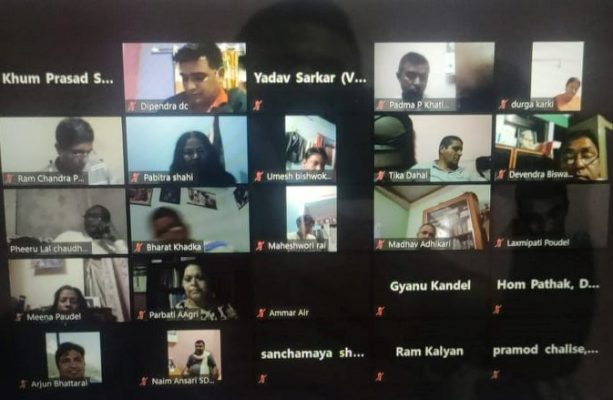Civil society organizations urged the Government to ensure that the post-earthquake reconstruction plan for post-earthquake Nepal is equitable, inclusive, participatory, and sustainable.
In a policy dialogue organized by the Humanitarian Accountability and Monitoring Initiative (HAMI) to discuss the government’s draft Reconstruction Plan, civil society organizations underlined the need to empower and include women and marginalized communities in planning and decision-making processes for reconstruction.
On behalf of Civil Society Organizations, HAMI Convener, Min Bahadur Shahi said, “The government must develop mechanisms that will ensure meaningful participation of affected communities at the district and VDC levels which will help ensure community ownership on the reconstruction initiatives.” Shahi also highlighted some of the pressing needs of the people affected by the earthquake. “The government should help people living in the temporary shelters prepare for the winter and provide ways to adequately protect livestock and grain,” Shahi added.
The National Reconstruction Authority (NRA) has identified 31 earthquake affected districts—14 highly affected, 11 affected, and 6 as moderately affected—for reconstruction and rehabilitation. It has also drafted a reconstruction plan, based on the recently conducted Post Disaster Needs Assessment (PDNA). The government has yet to make the document public.
“The government’s PDNA rightly proposes that rehabilitation should be equitable and inclusive. However, extra support might be required for those who don’t have the financial resources to build back safer,” said Cecilia Keizer, Country Director, Oxfam in Nepal. “It is also important that the communities receive accurate and timely information from government to build earthquake-resistant houses at the soonest possible time, before the winter season arrives,” Keizer added.
Govinda Raj Pokharel, the CEO of NRA gave his remarks on the reconstruction plan, while Jagannath Kurmi from National Network of Community based Disaster Management Committees (NCDMC) relayed the voices from communities. Prof. Pitamber Sharma, former NPC Vice Chair, in his keynote address, shared his views about the need for a democratic reconstruction framework. Similarly, geologist and earthquake expert Amod Mani Dixit highlighted the need to for disaster preparedness.
Other CSOs present at the policy dialogue reiterated the importance of a community-led reconstruction process, so that affected communities get a sense of ownership of the process, and feel motivated to commit and invest effort to make the plan work. A number of political party leaders also expressed their views on the reconstruction plan. The programme was followed by an open discussion between Constituent Assembly members from earthquake affected districts and civil society leaders.
Notes to the editor
- he government has established National Reconstruction Authority to work on the reconstruction plan for the people and places affected by the earthquake on April 25, 2015 and its powerful aftershocks. It has recently drafted a reconstruction plan, which is yet to be made public.
- As per the PDNA, at least NPR 669 billion or (USD 6.7 billion) will be required for reconstruction and rehabilitation. The government has set up National Reconstruction Fund of NPR 200 billion.
- The national budget of FY 2072/73 has allocated NPR. 74 billion for reconstruction and rehabilitation to the National Reconstruction Authority. Additional NPR. 17 million is allocated to the sectoral ministries.
- The government has also announced to extend a grant of Rs 200,000 to families whose houses were completely destroyed by the earthquake.
- On June 25, a donor’s conference was held in Kathmandu where USD 4.4 billion was pledged for the reconstruction.
- People in the villages not only lost their houses but storage space for grains and shelter for their livestock.
For further information and media enquiries, please contact: Min Shahi, Convener, HAMI minshahi@kirdarc.com, 9851077623 or Prerana Marasini, Media and Communications Lead, Oxfam, Lalitpur, pmarasini@oxfam.org.uk, 9851222666.



